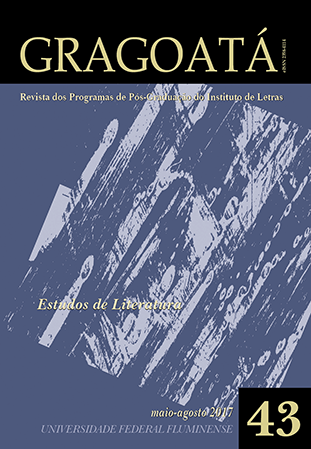Roland Barthes e a muralha chinesa
DOI:
https://doi.org/10.22409/gragoata.v22i43.33491Palavras-chave:
Roland Barthes. China. História Literária. Política.Resumo
Em 1974, Roland Barthes e uma comitiva de intelectuais ligados à revista francesa Tel Quel visitam a China de Mao Tsé-Tung. Durante as três semanas que passa no país, Barthes anota tudo o que vê e escuta, bem como o que pensa e sente. Essas notas vêm a público em 2009, com a publicação francesa dos Cadernos da viagem à China, e mostram um escritor entediado, aprisionado pelo discurso político que esteriliza a escrita literária. Ao contrário de seus companheiros de viagem, que se posicionam a favor ou contra o regime maoísta em livros e artigos publicados quando do retorno à França, Barthes escreve um texto curto e absolutamente neutro: “E então, a China?”, uma reflexão sobre as cores pálidas que viu e o chá fraco que experimentou, desvencilhando-se do que para ele era a verdadeira armadilha, a polaridade que fixa em uma posição cristalizada a favor ou contra, forçando um engajamento político em nome de uma doxa. O presente artigo contará a história dessa viagem e analisará os textos barthesianos que dela se originaram, interrogando-se sobre a relação entre Barthes e o estrangeiro.
---
DOI: http://dx.doi.org/10.22409/gragoata.2017n43a745.
Downloads
Downloads
Publicado
Edição
Seção
Licença
AUTORIZAÇÃO
Autores que publicam em Gragoatá concordam com os seguintes termos:
Os autores mantêm os direitos e cedem à revista o direito à primeira publicação, simultaneamente submetido a uma licença Creative Commons Atribuição 4.0 Internacional (CC BY 4.0), que permite o compartilhamento por terceiros com a devida menção ao autor e à primeira publicação pela Gragoatá.
Os autores podem entrar em acordos contratuais adicionais e separados para a distribuição não exclusiva da versão publicada da obra (por exemplo, postá-la em um repositório institucional ou publicá-la em um livro), com o reconhecimento de sua publicação inicial na Gragoatá.
A Gragoatá utiliza uma Licença Creative Commons - Atribuição CC BY 4.0 Internacional.











